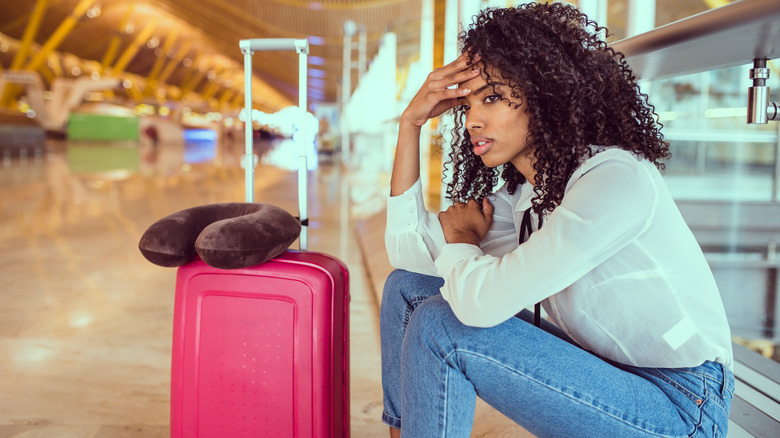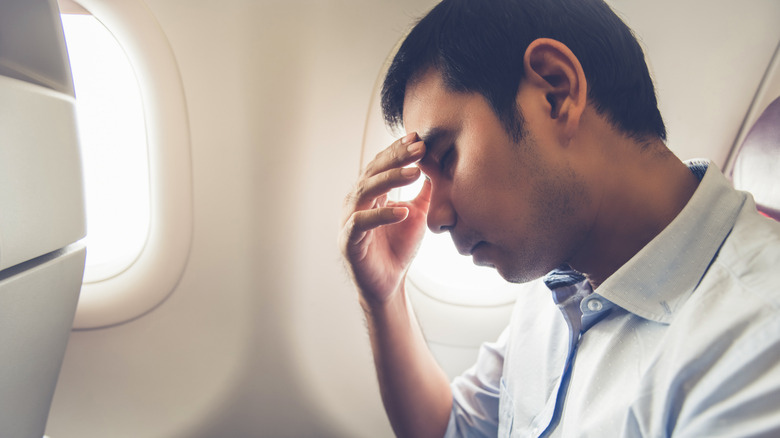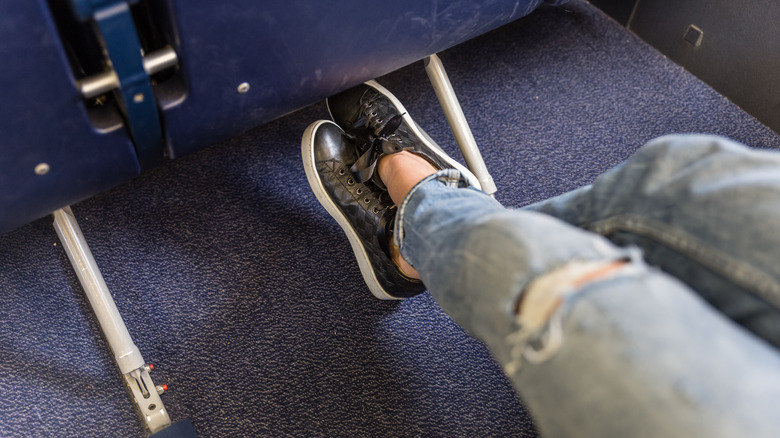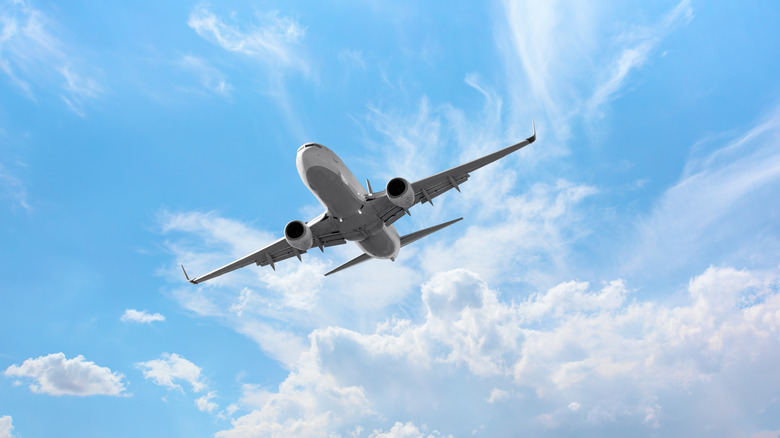Surprising Ways Traveling Can Affect Your Health
As vaccines are rolled out across different populations, it's anticipated that people will feel more confident about traversing the globe again (via The Conversation). The possibility of safe travel is expected to be on the horizon once again.
The abrupt shift from a highly mobile culture to a locked-down society has been challenging for a lot of people, as many view travel as an opportunity to unwind and an outlet for relieving stress (via Forbes). A 2020 study facilitated by American Express found that nearly half of the general population have felt "anxious and stressed” at the thought of not being able to travel abroad.
Travel can indeed be beneficial for your health, but, as it turns out, it can also have some negative consequences, as noted by the authors of a study in the Journal of Travel Medicine. This ultimately depends on the way people travel, the places they visit, and even the individuals themselves. Here's a look at some surprising ways that traveling can affect your health.
It reduces stress levels
While the planning and logistics of travel can, at times, feel overwhelming, exploring new places can help us feel happier. Sunshine is a well-known antidote to the blues and is able to ward off mental health issues (via Verywell Mind).
Research shows that traveling can have a positive effect on our wellbeing, relieving stress, and elevating our mood (via Verywell Mind). A holiday provides a much-needed, albeit temporary, escape from our day-to-day grind. People who regularly take time out to go on vacations are less prone to burnout, making them more productive at work than their worn-out peers, reported Verywell Mind.
Lending credence to this view, a 2018 study published in the International Journal of Environmental Research and Public Health found that three days after a vacation people reported lower levels of stress, a better quality of sleep, and an improved mood overall. Interestingly, the benefits they experienced lasted for up to five weeks after their trip ended, and these positive side-effects were particularly prevalent among those who enjoyed more personal time and felt a greater sense of satisfaction throughout their holiday. Other studies also verify that outdoor leisure travels, in particular, can get rid of stress and anxiety.
It can lower your risk of depression
According to scientific data, taking regular holidays has the power to decrease our risk of depression. A study published in the Wisconsin Medical Journal and conducted over five years found that people who took vacations twice a year were less likely to feel depressed, tired, or tense, compared to those who only vacationed once in two years. Interestingly, the subjects who traveled more also reported a greater sense of satisfaction in their marriages. The study authors hypothesized that the personal psychological benefits could also potentially lead to better work performance.
Depending on where you go, traveling can also mean that you get more sun, which is a proven mood-enhancer. A 2017 review article in the journal Neuropsychology discovered a significant relationship between depression and vitamin D deficiency.
Even the act of planning or anticipating an impending holiday can improve our mood and state of mind, according to a study in the Journal of Vacation Marketing. The findings revealed that people who knew they had a trip coming up experienced less negative and unpleasant feelings and were much happier with their life as a whole.
It can have a negative impact on your mental health
Some studies suggest that traveling can have an adverse effect on mental health (via Business Travel News). While research points towards the stress-relieving benefits of travel, jet-setting doesn't come without its hiccups. Most of us have likely experienced some travel-related drama at some point — missing a flight or losing our baggage at the airport — which can play havoc with our nerves.
In one study, psychologist Ad Vingerhoets hypothesized that travelers who overexert themselves while vacationing can experience a form of stress called "leisure sickness." Those who are particularly susceptible to this tend to possess "an inability to adapt to the non-working situation, a high need for achievement, and a high sense of responsibility with respect to work." They may find themselves experiencing headaches, fatigue, muscle aches, nausea, and even colds or flu-like symptoms during a trip.
It ultimately boils down to a spike in adrenaline, which kicks off the body's fight-or-flight response, Vingerhoets told Condé Nast Traveler. When the brain is finally able to slow down and rest, it may begin to register certain nuances with our health, such as any aches, pains, or illnesses that we may have previously tuned out as a coping mechanism, Heidi Hanna, the executive director of the American Institute of Stress, informed the publication.
It enhances your immune system
Not only does traveling do wonders for our emotional well-being, but it can also have a fortifying effect on our immune health (via Health Tech Zone). This may be attributed to its capacity to alleviate stress and depression. Research shows that feeling stressed out can harm our immune system's ability to fight off antigens, making us more susceptible to catching infections and illnesses (via Simply Psychology), whereas feeling happy keeps the body's natural defense mechanism in top shape (via Healthline).
Another explanation might be that when we visit different parts of the world, our bodies encounter new bacteria (via National Center for Biotechnology Information). Some of these germs will make us sick the first time we come into contact with them (e.g., childhood diseases like chickenpox) but the immune system ultimately adapts and develops the capacity to detect and fight these germs off in the future, becoming tougher in the long term.
It can increase your chances of getting sick
It's not uncommon for people to begrudgingly bring back a cold or flu after their vacation. Coming into contact with new bacteria in foreign destinations can certainly take its toll on your immune system.
Air travel is considered to be a major culprit for spreading germs as many people are sitting in close proximity to one another (via Prevention). "You're around more people than usual, in an enclosed space," Michael Angarone, assistant professor of infectious disease at Northwestern University's Feinberg School of Medicine, explained to the site, adding, "So if the person next to you has a virus and they're sneezing or coughing, that increases your chances of becoming infected." A 2008 study revealed that passengers in the aisle seats were more likely to catch a virus during a flight than others due to a greater chance of being exposed to the germs of people walking (and coughing) past them.
Feeling overexerted can also open the door for illnesses. While under stress, the body releases cortisol in larger amounts, which increases inflammation and weakens the immune system over time (via Cleveland Clinic). Stress also diminishes the body's lymphocytes, the white blood cells that battle bacteria and fend off infections. The lower your lymphocyte level, the greater your risk for a virus. Other factors that make us more vulnerable to illnesses while venturing abroad include a disruption to your sleep or medication routine, drinking contaminated tap water, or contracting a mosquito-borne virus (via Prevention).
Jet lag can cause health issues
Jet lag compromises our health in various ways. The term is used to describe the disruption caused to the body's internal clock — also known as our circadian rhythms — when it becomes desynchronized with the local time at our new destination (via National Sleep Foundation). This often occurs when traveling across two or more time zones.
Our circadian rhythms regulate our sleep-wake cycle. When this gets out of whack, we typically feel fatigued, struggle to fall asleep, and experience a deterioration in our physical and mental functioning, per the Sleep Foundation. It influences many aspects of our physiology ranging from our temperature to our eating habits and digestion as well as regulating our hormones, according to the National Institute of General Medical Sciences.
For the most part, jet lag is a short-term problem that disappears once the body's clock has readjusted to the time in your new locale. But people who frequently take long-distance flights may suffer from a chronically out-of-sync circadian rhythm, which, besides making them feel a bit wonky, can have a negative effect on their physical health, detailed a 2016 study. In particular, the study found that it raises the risk of diabetes, premature aging, metabolic syndrome, and numerous other disorders. Additionally, a 2017 study highlighted its capacity to impair cognition and bring about a psychiatric illness like depression. More severely, a 2015 study showed that in rare cases a persistently disoriented circadian rhythm can even underlie certain types of cancer.
It's good for your brain health
Traveling forces us outside of our comfort zones. It takes the brain off auto-pilot, as it requires us to adapt to new situations and environments and think about things in a new way. Unfamiliar sights, sounds, smells, tastes, and sensations create different synapses in the brain, which, in turn, encourages neurogenesis — that is, the "generation of new brain cells" (via NeuroHealth). For this reason, people who travel frequently are less likely to develop cognitive impairment, according to Michael Merzenich, a neuroscientist referred to as "the father of brain plasticity" (via Forbes).
This theory is supported by a study conducted by the U.S. Travel Association, the Global Commission on Aging, and the Transamerica Center for Retirement Studies, which showed that traveling offers the same type of cognitive benefits afforded by visiting a museum or doing a crossword puzzle. The mental activity and stimulation that travel typically provides promotes brain health and prevents the onset of degenerative diseases like dementia and Alzheimer's disease, particularly among retirees. The study also found that people who travel tend to have a more satisfied outlook on life compared to those who don't travel.
It can make you more creative
Traveling is a feast for the senses. From admiring breathtaking sights and natural landscapes to learning about new cultures and customs, it expands the mind and keeps it curious and active, allowing us to become more globally and culturally aware. It's not surprising, then, that international travel has been scientifically proven to increase creative output.
In a 2014 study published in the Academy of Management Journal, researchers analyzed collections at top fashion houses over the span of 11 years. Findings revealed that the brands whose creative directors had traveled and lived in other countries produced more creative and innovative designs than those whose directors had not. The level of creativity of the items was judged by a pool of fashion journalists and independent buyers.
"Foreign experiences increase both cognitive flexibility and depth and integrativeness of thought, the ability to make deep connections between disparate forms," Adam Galinsky, a study author and professor at Columbia Business School, told The Atlantic. Cognitive flexibility is the brain's ability to switch back and forth between multiple ideas, synthesizing different thoughts and information. "The key, critical process is multicultural engagement, immersion, and adaptation," added Galinsky. "Someone who lives abroad and doesn't engage with the local culture will likely get less of a creative boost than someone who travels abroad and really engages in the local environment."
It can even change your personality
Whether it's meeting new people or attempting to speak a foreign language, traveling and communication go hand in hand. Visiting new places for the first time usually involves having diverse social interactions, which allows for a better sense of connectedness and belonging (via The Atlantic). This might explain why people who travel or study overseas are generally more open, agreeable, and emotionally stable than those who don't, according to a 2013 study in the Journal of Personality and Social Psychology. The researchers found that while there was little personality change among people who stayed in their home country, those returning from extended trips abroad experienced an increase in personality traits like openness, agreeableness, and emotional stability. Results also showed that subjects became nicer, more sympathetic, and more cooperative compared to how they were before they set off on their travels.
"What a lot of psychological research has shown now is that the ability to engage with people from different backgrounds than yourself, and the ability to get out of your own social comfort zone, is helping you to build a strong and acculturated sense of your own self," Mary Helen Immordino-Yang, an associate professor of education and psychology at the University of Southern California, told The Atlantic.
Additionally, a 2016 survey carried out by the travel search site Momondo revealed that people are also more trusting towards different people and cultures after they've traveled for some time.
It decreases your risk of heart disease
Moderate exercise lowers your risk of cardiovascular death by up to 50% in individuals 65 years of age or older (via ScienceDaily). Travelers are generally fairly active, since visiting a new country often involves walking, sightseeing, and trying out new activities like hiking or water sports. This correlates with research findings that people who regularly go on vacation tend to be healthier.
A joint study from the Global Commission on Aging and Transamerica Center for Retirement Studies and the U.S. Travel Association says that women who vacation at least twice a year have a lower risk of experiencing a heart attack or coronary death in comparison to women who vacation once every six years. The study also found that men who don't take annual vacations have a greater risk of developing heart disease. Overall, traveling was attributed to a reduced risk of developing a dangerous condition, even when individuals had pre-existing health issues like high blood pressure.
It can help you live longer
Avid travelers will be happy to know that scientific research has discovered a connection between travel and an increase in life expectancy. Given its myriad health benefits, it's not surprising that embarking on a vacation can go so far as prolonging your lifespan, says a 2018 study published in the Journal of Nutrition, Health & Aging.
The longitudinal study began in the 1970s and recruited over 1,200 businessmen aged between 40 and 55. It evaluated the impact of mid-life risk factors on the quality of life and well-being of men who were asked to make a number of positive lifestyle changes, such as an increase in exercise, an improvement to their diets, reaching a healthy weight, and stopping smoking. The researchers found that men who enjoyed more vacation time had a lower mortality rate than men who didn't. Other culprits that heighten mortality rate, according to the study, include working too hard and not sleeping enough.
Long-haul flights can cause deep vein thrombosis
Long-distance flights can be draining. But they can also be risky for both rookie and seasoned globetrotters who have a susceptibility for blood clots (via Healthline). Deep vein thrombosis (DVT) is a dangerous condition that occurs when a blood clot develops in a large vein, stopping blood flow, explained Healthline. This typically occurs in the thigh or lower leg, but it can also form in other areas of the body. Part of the clot can break off and travel through the bloodstream to the lungs, causing a blockage in the arteries, which is known as a pulmonary embolism (via CDC). Though rare, these conditions can be fatal.
Since DVT can be caused by sitting still for long periods of time, people are at a higher risk when they travel by air. It can also happen during lengthy bus, train, or car journeys, where it's hard for people to get up and walk around (via CDC). In general, the longer the journey, the greater the risk. A 2015 study revealed the prevalence of DVT within 48 hours of landing is between 2% and 10%. Additionally, young women using oral contraceptives and high-level competitive athletes are at a marked risk for developing the condition.
Long-distance travelers can take certain steps to help prevent DVT, such as getting up and moving around if traveling by plane or train or taking regular breaks in their travel schedule when journeying by car (via CDC).
It can alter your hormones
Traveling can tamper with our hormones for a number of reasons. When people find that their anxiety is catapulted, the body's "fight or flight" response sets off a surge of stress hormones including cortisol and adrenaline (via Hormone Health Network). If you're frequently facing challenges and mishaps during your trip, the body releases higher levels of these hormones into the bloodstream without much time to recover, which could trigger a hormonal imbalance (via Healthline).
Some women notice that their periods are suddenly MIA whilst traveling. This may also stem from stress, which temporarily alters the brain's hypothalamus — the control center for the hormones that are in charge of your menstrual cycle (via Mayo Clinic).
An abrupt change in sleep patterns is one of the main reasons why travel affects a woman's hormonal timetable and menstrual cycle, according to Carla Bossano, assistant professor of gynecology and obstetrics at the Johns Hopkins University School of Medicine, who spoke to Self. Although, an off-schedule period may also be the result of too many nights out spent partying or discovering a new city. "Any sort of stress, even 'good' stress like a vacation, can throw off your cycle," Dr. Bossano told the publication. This is essentially the body's way of avoiding pregnancy in an undesirable situation.
Air travel exposes you to radiation
What most flyers rarely think about is that traveling by airplane exposes us to low levels of radiation. In the grand scheme of things, the amount of radiation per flight is extremely small; for example, a typical commercial airline flight, traveling within the United States from the east to the west coast, has less radiation exposure than what we'd get from a single chest x-ray (via CDC). But the higher we go in altitude, the higher the dose of radiation. This is because the farther we venture from the Earth's surface, the thinner the air gets and the fewer the gas molecules in the atmosphere, which shield us from the incoming cosmic radiation from outer space (via Scientific American).
For the average flyer, the health risks associated with this are trivial, but they're more pressing for people who make their living in the air, which is why the Centers for Disease Control and Prevention classifies pilots and airline crew as "radiation workers." The main threat for travelers is an increased risk of developing cancer at some point in their lives, which scientists estimate to be minuscule, according to Scientific American.
It can improve your bone health
Many people travel the world so that we can see and try new things. This often entails a great deal of walking, hiking, sightseeing, and movement from one place to another, all of which help build stronger muscles and bone tissue and reduces our risk for osteoporosis, a disease that signifies thin and brittle bones (via OrthoInfo).
Vitamin D also plays a critical role in the maintenance of healthy bones (via EndocrineWeb). It allows the body to effectively absorb calcium; Both nutrients then work together to strengthen the bones. A 2018 study concluded that, contrary to popular belief, vitamin D supplements don't improve musculoskeletal health, which reinforces the importance of getting our regular dose of vitamin D from natural sources like sunlight.
Other health benefits of vitamin D — often called the "sunshine vitamin" — include a sturdier immune system, improved oral health, and lower susceptibility to diabetes and hypertension (via Health). Whether you're wandering the city, sitting on a beach, or skiing, traveling provides ample opportunities to be outside in the sunshine, soaking up some rays of vitamin D.
















